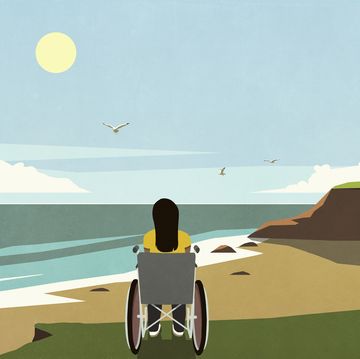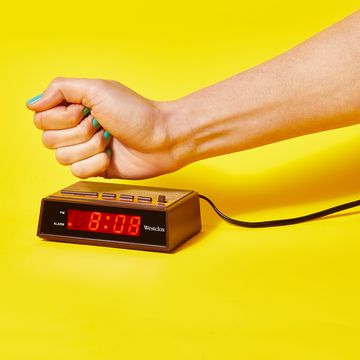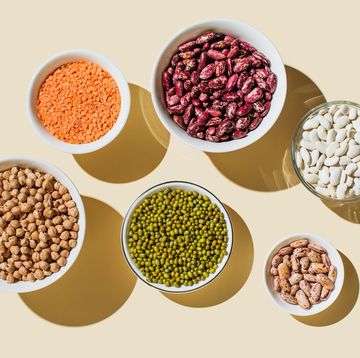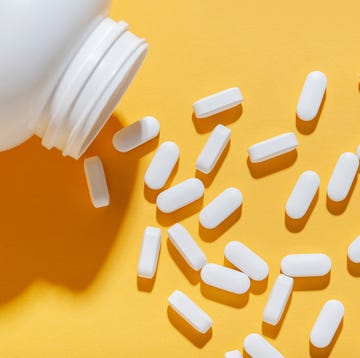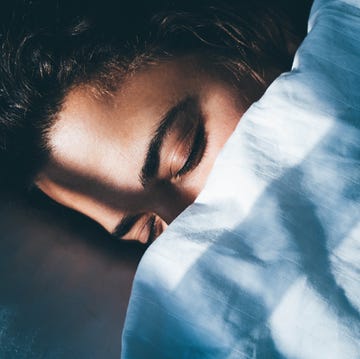Plenty of women love breastfeeding — after all, it's a one-of-a-kind experience exclusively reserved for parents, and it releases special chemicals that help you feel extra close to your baby. But even the most enthusiastic advocates are susceptible to a common, but scary condition that can affect up to 20% of breastfeeders a year: It's called mastitis, breast inflammation that can be linked to a breast tissue infection. And it can be extremely painful.
Lindsey Bliss is a Queens, New York-based mother who breastfed all six of her biological children, including two sets of twins which she nursed in tandem. She didn't experience mastitis until nursing her youngest child, and recently posted the photo below featuring her inflamed breast to raise awareness about the condition.
"It literally feels like someone kicked me in the breast," says Bliss, a birth doula and co-director at Carriage House Birth, an organization that fosters community among birth doulas and postpartum care providers. Despite her training, she didn't know what hit her. "No one really warns you about how powerful mastitis is," she says. "Your boob can cause a full body shut down."
As it happened, Bliss's symptoms were so severe she almost went to the emergency room: The infection affected her entire body, complete with a swollen, red-hot breast and milk duct discharge, plus full body shakes and uncontrollable teeth chattering.
Flu-like symptoms, Bliss soon learned, are a telltale sign of mastitis, which occurs when milk clogs a woman's milk duct, leading to a bacterial infection, according to American Congress of Obstetricians (ACOG). It can be caused by anything from stress and fatigue, to pressure on the breast from a bra that's too tight, missed feedings, or poor hand or breast pump hygiene, according to The Academy of Breastfeeding Medicine. And although it's most common during the early days of breastfeeding, it can hit at any time — even among women who aren't pregnant or breastfeeding.
While emptying the affected breast can help with mastitis, antibiotics are your best line of defense if symptoms last for more than 12 to 24 hours, one sign your mastitis is caused by a bacterial infection and won't clear up on its own. Waiting can prolong your discomfort and potentially worsen your infection.
Definitely reach out to your doctor or pediatrician if you'r experiencing symptoms. For the pain, he/she will likely recommend popping an anti-inflammatory like ibuprofen, or apply a warm, wet cloth for 15 to 20 minutes a few times a day. (Bliss says she also swears by hot Epsom baths.)
Because draining the inflamed breast is the best way to manage discomfort, you can and should continue to breastfeed your baby (or pump) despite infection — even while taking antibiotics. There's no evidence that breastfeeding will spread the infection to your child, although you should always consult your doctor if you're concerned.
But Bliss's not trying to scare women away from breastfeeding; rather, her goal in posting the photo above is to spread awareness.
"You always see these flawless goddess photos of breastfeeding, and no one discusses or shows when s--t gets crazy," she says. "Yes, [you might think] breastfeeding is the best thing for your child, but it isn't always unicorns and rainbows," she says. "Sometimes it just sucks."
If mastitis happens to you while breastfeeding, following the protocol above should clear things up within a few days. It's a pain for sure, but a small price to pay if you're set on nursing.

Elizabeth Narins is a Brooklyn, NY-based writer and a former senior editor at Cosmopolitan.com, where she wrote about fitness, health, and more. Follow her at @ejnarins.


